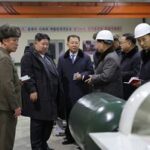|
Although China’s battery industry has rapidly grown to a globally competitive level in a short period, it is predicted to falter due to overproduction and U.S.-China conflicts. However, Chinese battery companies blocked from entering the U.S. market are launching a low-cost offensive competition between Korea and China that may intensify in markets like Europe.
According to a report titled “China’s Battery Industry Competitiveness: Focusing on the Supply Chain” written by Shin Dong-ju, the head of the Bank of Korea’s Beijing office, on the 22nd, the global market share (excluding China) of Chinese battery companies skyrocketed from 1.9% in 2019 to over 30% in 2023.
The rapid growth of China’s battery industry is due to the strong industrial policy of the government, which supports product competitiveness based on the domestic market from the early stages of growth. They have secured price competitiveness by achieving vertical integration throughout the whole battery supply chain. In particular, mineral refining and processing occupy an almost monopolistic position in China due to relatively weak environmental regulations.
China has also actively pursued technological and item diversification. Since 2010, it has focused on the production of LFP (Lithium Iron Phosphate) batteries for domestic market sales, gradually improving shortcomings such as short driving distance and low-temperature tolerance. LFP batteries are about 30% cheaper than NCM (Nickel Cobalt Manganese) batteries because they do not contain expensive minerals such as nickel and cobalt. China has even secured the production capacity of NCM series batteries, an area where Korea had an advantage, narrowing the technology gap with Korea to about two years.
However, given the domestic and foreign market conditions, it is predicted that the Chinese battery industry will face significant challenges going forward. First, production adjustments are needed for the time being because of the spike in battery inventory caused by excessive investment and production. As of the end of last year, the operation rate of Chinese battery factories fell to 50~60%. One significant upstream business that will inevitably be impacted by the slowdown in global growth is the electric car sector. In particular, the U.S.-China conflict makes it difficult for the Chinese battery industry to enter overseas markets. With the Inflation Reduction Act (IRA), it is virtually impossible to enter the U.S., and the possibility of regulation by European countries is raised.
In this process, competition between countries and companies to increase global market share is expected to become even more intense. First, China is expected to launch an aggressive offensive with LFP batteries by increasing the proportion of low-cost and popular models to increase the popularity of electric automobiles. Although Korean battery companies are currently producing LFP batteries in parallel, they may fall behind China in terms of price competitiveness.
In the U.S. market, Korean companies are expected to gradually increase their market share due to restrictions on Chinese companies. On the other hand, in the European market, where regulation against China is relatively low, competition between Korea and China is bound to be fierce. Shin said, “The possibility of LFP batteries becoming the main item due to driving distance or high output restrictions is limited,” and “competition between countries to secure high technology is expected to intensify further in the future.”
By. Ji Won Cho
















Most Commented